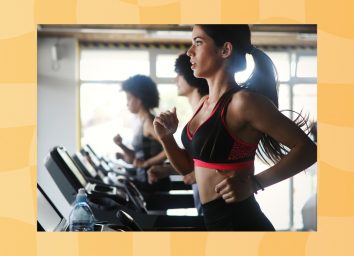Longevity Expert Swears by These 7 Exercises for Stronger Muscles & Less Pain
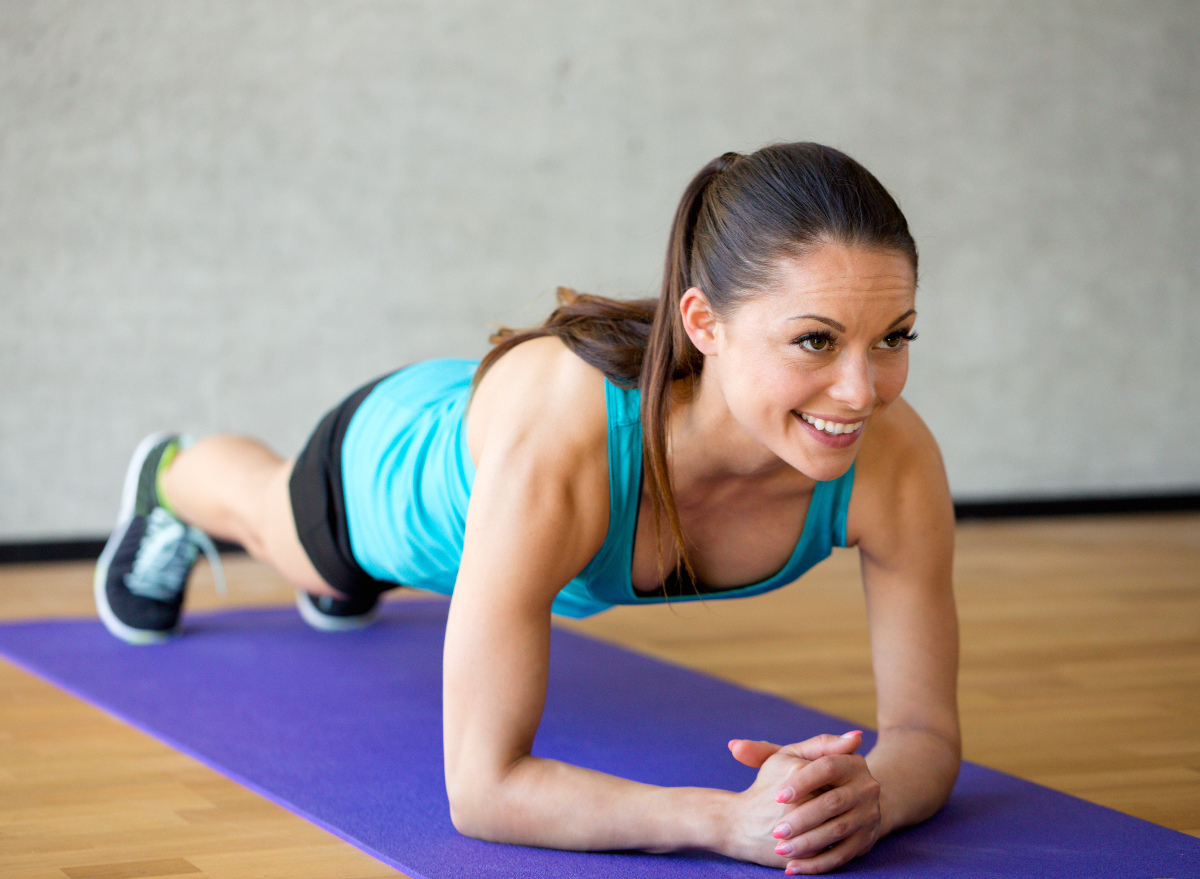
One of the most challenging aspects of growing older is dealing with changes in your body. After hitting 30, testosterone starts to decline in both men and women. This can result in muscle loss and speed up a "disorder of carbohydrate metabolism," which affects almost everyone, explains Florence Comite, MD, an innovator in precision medicine with multiple specialties in endocrinology and the founder of the Comite Center for Precision Medicine & Health. These changes make you more susceptible to age-related diseases such as stroke, diabetes, osteoporosis, heart disease, and cancer. To continue to lead an independent, healthy existence, we found out the best exercises for stronger muscles from a longevity expert.
"As a physician-scientist specializing in optimizing healthspan, I know that exercise, specifically resistance exercise, to maintain muscle mass is a key factor in prolonging a healthy life—from metabolic function to reversing aging disorders," Dr. Comite explains. "Typically, I recommend our clients include two sessions of strength training workouts in addition to cardiovascular exercises, like walking, running, cycling, swimming (especially ideal with joint pain or difficulty walking), or playing a favorite aerobic sport. Add HIIT, or high-intensity interval training, at least two times, as described later."
Below, you'll find some of the best exercises for stronger muscles a longevity expert swears by. Gear up to sculpt and maintain your muscles, along with strengthening your heart in the process. But before starting any new workout, it's always recommended to check in with your physician to see if it's the right fit for you. If it is, start slow and work your way up to some of the more vigorous exercises on Dr. Comite's list.
Steady-State Walking
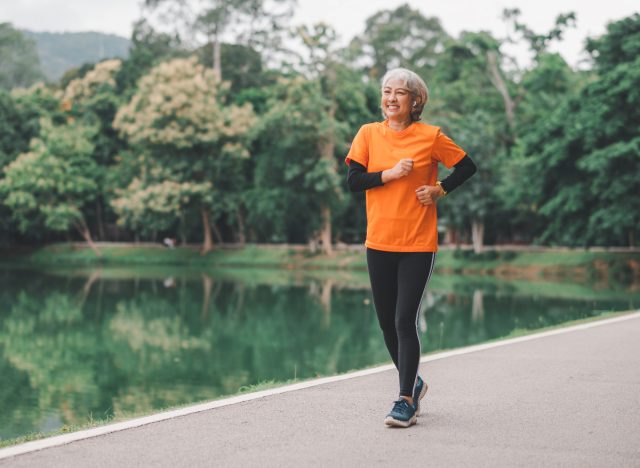
Lacing up your shoes and heading out for a brisk steady-state walk is a stellar form of low-impact cardiovascular exercise and endurance training. "Specifically, focusing on Zone 2 heart rate training (65% to 75% of your max heart rate) can help improve aerobic capacity, enhance fat utilization as an energy source, and increase blood flow that aids exercise recovery," Dr. Comite tells us. "A steady-state walk that maintains your heart rate in this zone can help joint health, mental health, longevity, and even pain management." She suggests walking for 45 to 90 minutes.
Diaphragmatic Breathing

Amid the busy world we live in, how many times a day are you truly mindful of your breathing? Dr. Comite informs us that the main reason why you experience muscular discomfort through tightness is because you're not breathing correctly during the day and in your workouts.
"We 'chest-breathe' when we should be 'belly-breathing,'" she says. "To practice diaphragmatic breathing, place a hand on your belly and take a deep breath, concentrating on allowing your belly to rise before your chest does. Once you get the hang of deep belly or diaphragmatic breathing, try two breathing exercises, 90/90 and Quadruped breathing … These moves help prime the nervous system for activity, reset our bodies from prolonged seated positions, and help ease lower back and neck pain through proper alignment." Your goal should be to complete three sets of eight to 10 breaths each every day.
Plank/Side Plank
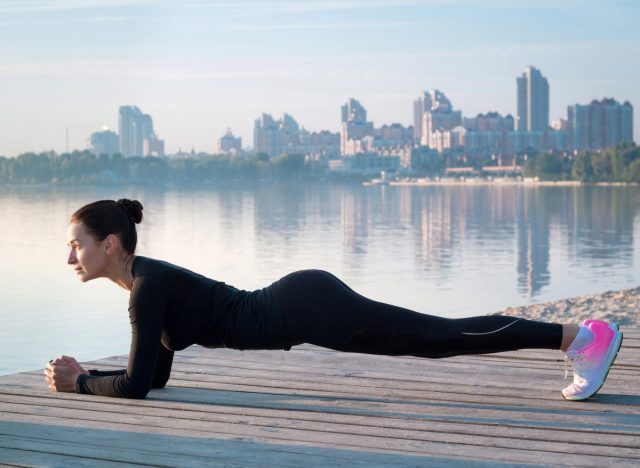
Performing plans and side plans is an excellent way to boost your core muscles and enhance your isometric strength. "A strong core is essential for stability, balance, and proper posture, and [it] transfers directly to correct exercise techniques," Dr. Comite explains. "These are also low-impact exercises, making them suitable for individuals of various fitness levels and ages. Strong core muscles are essential to preventing injury both during exercise and everyday activities."
Pull-ups/Inverted Rows
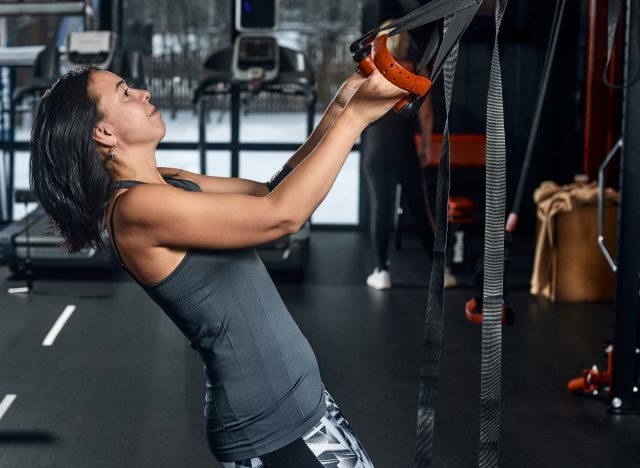
Whether you perform pull-ups or inverted rows, you're putting your body weight to work, using it as a "load" for these upper-body exercises. "They both are fantastic exercises for improving posture, mobilizing your shoulders, and strengthening your upper-back muscles," says Dr. Comite. "They also improve grip strength, which is an important metric for longevity and contributes to slowing the process of immune defense loss associated with aging. Exercises that leverage your own body weight are great ways to gain familiarity with your muscles and build proper form before progressing to more intense activities."
Goblet Squats
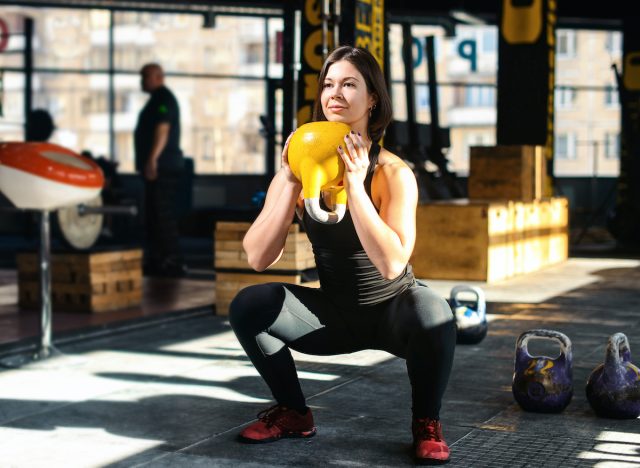
Next up, Dr. Comite recommends goblet squats, which involve squatting as you hold a dumbbell or kettlebell like a goblet. "Squats are a crucial exercise for adding strength to our quads, knee joints, and connective tissue in our knees and hips," Dr. Comite explains. "Goblet squats are effective because they require your core, upper body, and lower body strength to work in conjunction to move the load, enhancing muscular proprioception and coordination. By increasing the weight used over time, you will build and strengthen muscles across your entire body."
High-Intensity Interval Training
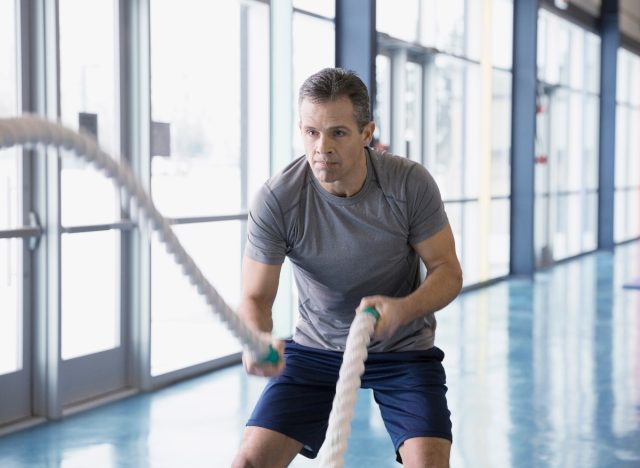
High-intensity interval training (HIIT) is a key part of any efficient fitness routine. This form of training will cause heart rate variability and ensure that you achieve 80% to 90% of your max heart rate, Dr. Comite says. "Using an Airbike, treadmill, rower, elliptical, or Starimaster to work at an intensity that you can hold steady for the course of the two minutes, followed by a two-minute rest for several rounds, can achieve the benefits of this exercise," she adds. "HIIT workouts are helpful as they burn many calories, lose fat, and build muscle. Your metabolic rate is also higher for longer following a HIIT workout, which can help reduce heart rate, blood pressure, and blood sugar."
Trap Bar Deadlift
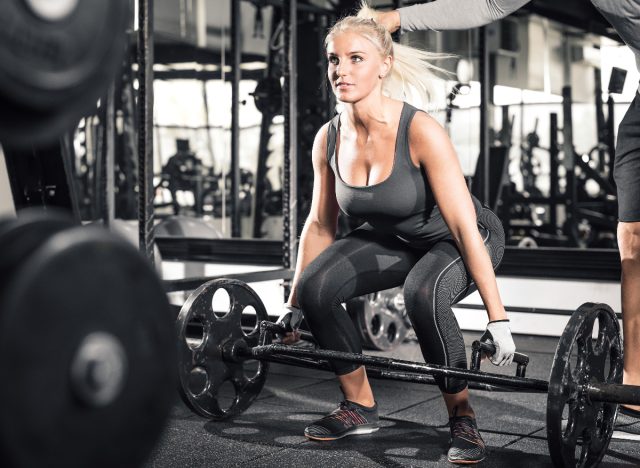
This list of the best exercises for stronger muscles wraps up with the trap bar deadlift, where you perform deadlifts using a trap bar. The act of deadlifting is a key strength training exercise that boosts your longevity and promotes better pain management, according to Dr. Comite. "Trap bar deadlifting reduces shear force on the lumbar spine, is easier on your joints and shoulders, and is more versatile than a conventional deadlift," she says. "This exercise is crucial as it engages your entire posterior chain muscles (glutes, hamstrings, calves, erector spinae, lats, and rear shoulder muscles), which helps with functional tasks and chores in your daily life, as well as promoting balance and coordination. Additionally, it will help with long-term muscle preservation, mitigating the effects of osteoporosis and bone mineral loss." Dr. Comite suggests starting with five sets of five reps, using the correct form.


